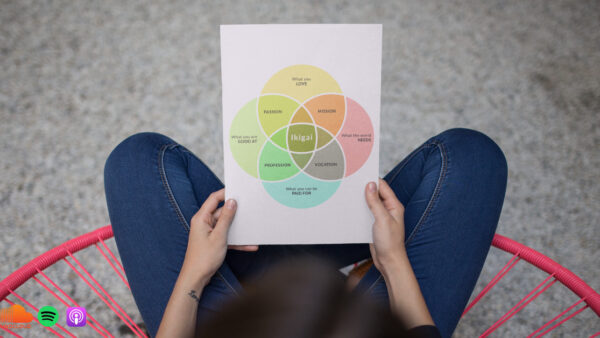Out there in the world, and in the world of work, there’s been a lot of upheaval in recent times. A lot of competing forces, emotions, pressures, and fears. People have been fearful about their job security, followed by a stampede for the exit door in the great resignation. Concerns about the rising cost of living are putting pressure on people to be more careful about making a move. It’s pretty confusing and no one knows what’s next.
Well, I say that. But there are some certainties. You’re you for example and that’s not going to change, however crazy the world gets. And the thing with the you you are now, and the last few years that you’ve successfully navigated through is that you’ll be you with eyes wider open, maybe having had some experiences at work and outside of work that you weren’t expecting – more homeworking, job uncertainties, concerns about friends and family, whatever’s happened to you, it’s relevant.
And while we always have the opportunity to reflect on what’s happened and make choices about our future, right now seems to present an unusual opportunity for that because of the extremes of experience that we’ve had, what we’ve learned about what’s important to us, what we value, perhaps even getting greater clarity on what we want our lives to look like, and what we don’t want them to look like.
I’ve spoken to people who used to love travelling into the office 4-5 days a week and who now don’t plan on going in more than once a week because they’ve found other sources of energy, pleasure and joy. Is that you? Could that be you? Other people who have decided that now’s the time to change careers because they feel there’s nothing holding them at work anymore – their loyalties and connection have been diluted over the past few years and they’re clearer now on what they want.
So if any of this is resonating for you, how can you make sense of it? How can you work out what you really want post-pandemic? I have 5 questions for you to consider. In no particular order, but wow, are they big questions. Suggest you don’t go for them all in one go. If what’s said so far speaks to you, pick a question that resonates the most and start there.
Question 1: What do you want your (work) life to look like? And not?
‘What do you want your life to look like?’ is one of the greatest coaching questions that’s ever been shared with me. Ideally, it’s followed by a very long pause because it works best with some deep reflection, maybe some visualisation and only after that, with some discussion. This question for me, nails where many people are at right now, post-pandemic…with greater clarity on what they like and don’t like, want and don’t want from work and in their lives right now.
These wants may change but we’ve all learned new ways of working, thinking, feeling, we’ve reprioritised and this question can help you honour those experiences by asking you to reimagine and redesign your life (at least in concept initially).
So how do you want your ideal week to look – will you be working five days a week? Seven? Three? Where will you be working – how far away from home? What’s the commute like? How often do you go in? What are you doing? Is it easy, challenging, similar each day or with bags of variety, are you working directly with people or solo and how much of the time? Indoors, outdoors, travelling, how much screen time?
Imagine it. Properly imagine it. If you had a magic wand and you were going to wave it and you’d be in your ideal work life, what would it actually look like? And feel like?
And if you haven’t gone there already, what about your wider than work life – we’re all a lot more aware now of work-life balance and work-life blend and how that’s possible, as long as we boundary well. So how much time do you want to be spending not working? And what will you be doing?
As I say, this question needs reflection, visualisation, as well as being really honest with yourself. It’s huge. So give it time.
Question 2: What unique value can you bring?
Here come your strengths. And your skills, your attitude, your experience. More honesty needed here to get you thinking clearly about the value you can create at work that is unique to you. That no one else can do. And those things that others can do but not in the WAY that you do.
Start by completing Strengthscope. Or redo it. Use it to work out what energises, drives and motivates you at work. Add to that the work that you’re most proud of, your key achievements up to now. See if you can make links between the two – how did you use your strengths and skills and experiences to achieve the things that make you feel most proud and fulfilled.
That’s the gold! Because that’s how you brought value in your own unique way. Go through that process with a few of your key achievements and you should get a pretty good idea of what makes the way you approach work special.
Add to that what other people say about you. Go and ask them – where do they see you contributing at your very best. Add it all into the mix. Stir and leave to rest. Return as required to see how your recipe is developing.
Question 3: How can you respark your passion?
Now we’ve covered your unique value. But what about what brings you to life and keeps you feeling powerful, energised and in flow? What is flow even? For a detailed answer to that question, go back to Season 11 episode 10: What is flow and how can you use it to manage stress?
For now, I have a simple answer. Flow is what happens when you’re completely immersed in what you do. Probably you’re being stretched a little bit in terms of your abilities but you can more than meet the challenge and that combination feels amazing, so you lose yourself in the work more and more until you lose track of time, you maybe even lose track of self. You’re in flow.
When did that last happen to you? When’s it happened in the past? Can you find links between flow moments and the most fulfilling work you’ve ever done? How can you do more of it? What career or role would give you the greatest access to this most of the time? So that you could be that person who says ‘My job? I’m so lucky…it really doesn’t feel like work at all most of the time.’
As we’re in this space, there’s more exploring you can do by looking into ikigai, the Japanese concept of finding purpose. Check out Season 6, episode 6 – Want to live longer, you need ikigai and while you’re at it, Season 12 episode 4 – How to get the career you want: ikigai x strengths = your killer career. The reason to check these out is that Ikigai intersects what we’ve been talking about in practical ways. It helps you find what you’re good at (that’s the value we talk about in question 2), what you love (which is what we’re talking about now), what the world needs and what you can be paid for.
We’re going to look a little bit more into what the world needs in question 4…
Question 4: How can you find work that aligns with your values?
My view is that a lot of people got involved in the Great Resignation in the search for the answer to this question. Whatever experiences you may have had during the pandemic for many people, there was a sense of disappointment that their employer wasn’t there for them as much as they’d hoped or expected. And that didn’t sit well with people’s values. So they chose to move on.
What do you value? Loyalty, authenticity, respect, humour, fun, curiosity, honesty? There are endless lists of values around but you can work out yours by answering that question – what do you value? Also, what riles you up and makes you agitated or angry? That can be a sign that one of your core values is being challenged.
Once you’re clearer on your core values, then you can find a role, a career and an organisation that is aligned with them. So, you’re not facing into a sense of emptiness or things not feeling quite right without you being able to quite put your finger on it.
Answering this question needs honesty – are you able to fulfill your values in what you’re doing right now work-wise and if not, how can you get closer to being able to answer yes to this question? Look at different industries, different types of roles, look at the cultures in different organisations and see where you might fit the best, so that you be you and bring you, wholeheartedly, to work each day.
Question 5: How can you overcome self-doubt to get what you really want?
I couldn’t complete this episode without asking a question around the biggest barrier of all for many people – how can you get over that sense of self-doubt that will stop you from going for what you really want post-pandemic?
Sometimes, doubts will come in the shape of financial anxiety (‘Can I make this pay?’). Other times, in the form of skill gaps (‘How could I do it, I don’t have the skills or experience needed’). And most often just as the formless gnawing sense of uncertainty that comes with not having been there before.
Most of these fears and anxieties can be met head-on by going and educating yourself about what exactly is involved in making your dream move to get what you really want. You might find that you’d make less money than you used to, or more, that the best opportunities need you to retrain or make a sideways or downward career move, or that you already have the skills you need to be in demand.
In my experience, most people stop themselves at this point before they’ve done the information-gathering and that’s a shame. I remember working with someone who was leaving the Armed Forces, entirely convinced that their opportunities in the service sector would be limited by them having an exclusively military career since school. How wrong they were – they ended up in a senior banking role in crisis management. They just hadn’t thought laterally about how or where their skills and experience might be in demand.
The time is right, right now, to get what you really want
So go for it. Spend the time you need to deeply explore the questions I’ve outlined today. And then start to re-carve your life in the shape that you really want. You deserve it. Till next time. Stay strong.









